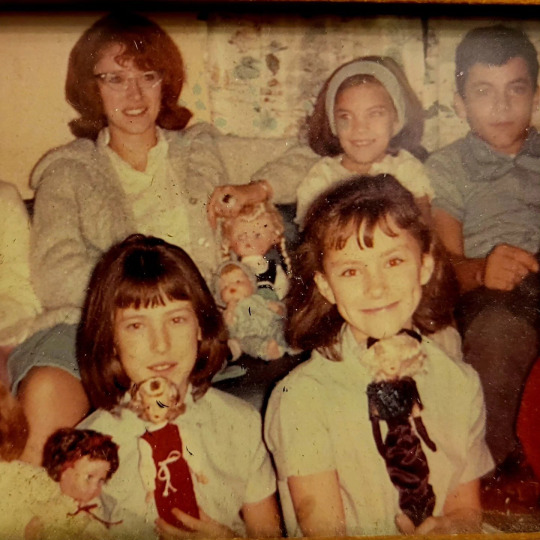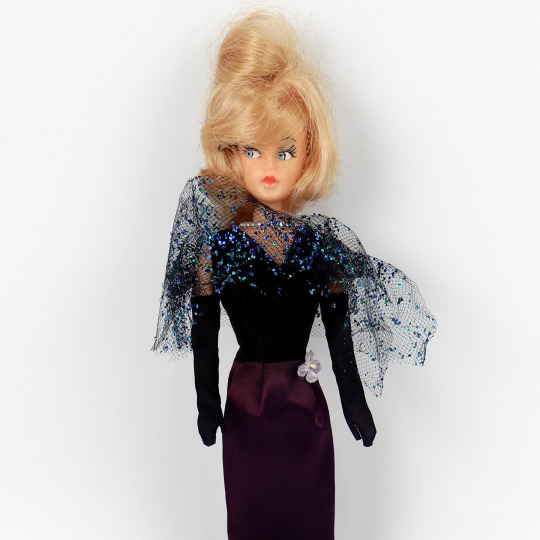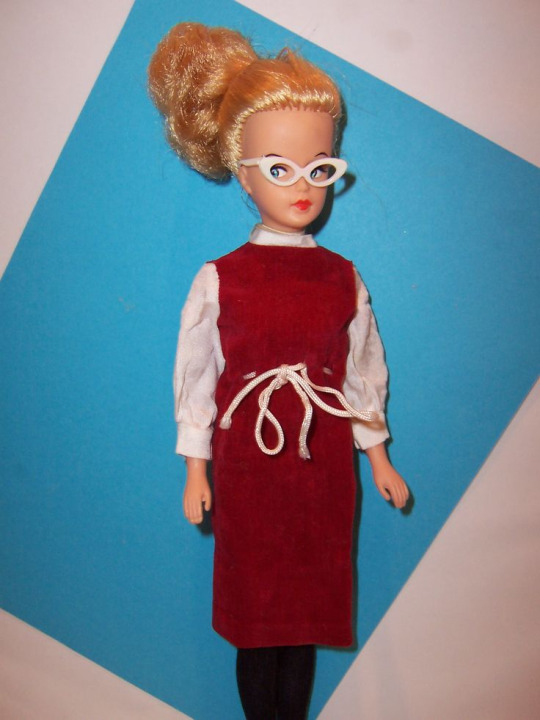#Tressy
Explore tagged Tumblr posts
Text
Estate Sale Haul! So many vintage dolls Barbie, Tammy, Tressy…
#barbie#doll#vintage#mattel#collection#vintagedollhunters#review#youtube#george#rodriguez#georginathedollwigs#haul#estate sale#timoteo#cañez#canez#Tammy#Tressy#ideal toy corp#American Characters
3 notes
·
View notes
Text



Vintage Ideal Tressy 1970s "growing hair" doll
(add ebay link later)
#vintage#vintage goods#collectible#knick knacks#vintage doll#ideal doll#tressy#tressy doll#vintage dolls#vintage toy#vintage toys#70s dolls
0 notes
Quote
I also keep my eyes on the South because the Republican strategy of disenfranchisement is a state-by-state strategy. It looks like judicial rule where they cannot win. Where they cannot win by judicial rule, they will rule by procedural theft. Where they cannot convince voters to vote for them, they will convince the candidate they voted for to become one of them.
Tressie McMillan Cottom at the New York Times.
A great summing up of the GOP strategy to cling to power at all costs. And this strategy is certainly not limited to Southern states.
She’s quite right about this being a state-by-state battle. Keep up with state government. Start by learning who your state legislators are.
Find Your Legislators Look your legislators up by address or use your current location.
#tressie mcmillan cottom#republicans#gop strategy of disenfranchisement#state government#state legislatures
184 notes
·
View notes
Text
The American Diabetes Association developed the term “prediabetes” to bring attention to slightly elevated blood sugar levels in some Americans in 2001. Over the next two decades, the organization expanded the definition of the condition, so that by 2019, as Charles Piller reported for Science magazine, 84 million Americans had prediabetes, “the most common chronic disease after obesity.”
There were no drugs specifically designed for prediabetes, so doctors often relied on off-label treatments, a common medical practice. But because off-label drug interventions coincided with the wholesale expanded classification of millions of people with a novel condition, a new market boomed.
This shift broadened the consumer language for medicalizing weight loss as a preventive strategy to treat not only diabetes, but also supposed — though not always proven — diabetes risk. It armed a wellness machine with the medical terminology of “insulin resistance” and “insulin sensitivity,” without the medical expertise to screen for diabetes risk indicators. People could soon buy an astonishing array of apps and devices to self-diagnose insulin efficiency. Enter Ozempic and Wegovy, perfectly designed for our highly developed consumer palates.
Given all these changes, I wondered what Dr. Richard Kahn, the former chief scientific and medical officer at the American Diabetes Association, who helped establish “prediabetes” as a term, now thought about the phenomenon.
When we talked, Dr. Kahn told me that he regrets his role in developing “prediabetes” and its associated grift, but his giddiness about GLP-1 drugs was palpable. He said that encouraging weight loss through lifestyle changes was an “abject failure.” Now, Ozempic offers patients light and hope.
The problem with these drugs, he said, “is that they cost an enormous amount of money.”
From Tressie McMillan Cottom
Oh, fyi: I weigh about 400lbs. I do not have diabetes or prediabetes.
10 notes
·
View notes
Text
During the pandemic, we, fans, have been able to rely on some of our already existing coping mechanisms to deal with the increased strain of our mental health due to the global crisis. Participants in a study about the mental health of PhD students during the pandemic responded that their coping strategies mainly included social interaction and recreational activities. Furthermore,
Lower scores of depression and anxiety were predicted by the strength of the overall social network (…) NAUMANN, SANDRA, LENA MATYJEK, KATHARINA BÖGL, SCHOLAR MINDS, AND ISABEL DZIOBEK. UPDATE ON THE MENTAL HEALTH CRISIS IN ACADEMIA: EFFECTS OF THE COVID-19 PANDEMIC ON EARLY CAREER RESEARCHERS’ MENTAL HEALTH AND SATISFACTION WITH PHD TRAINING, 2022.
In another survey, this one about Philippine BTS fans, social interaction and recreational activities were both listed as ways that fandom supported participants’ mental health.
Despite being isolated from one another geographically due to the lockdown, the fans felt that BTS was with them throughout the pandemic, through their music, live videos, tweets, pictures, and even the mere thought of them. VANGUARDIA, MARC. “LOVE YOURSELF, BTS ARMY: PARTICIPATORY FANDOM AND AGENCY DURING THE COVID-19 PANDEMIC.” PHILIPPINES COMMUNICATION SOCIETY REVIEW, 2021, 229.
These digital networks of intimacy allowed for comfort, happiness, and healing to be conveyed and received across miles in the physical realm and created imagined yet profound connections that acted as safe spaces for ARMYs online. VANGUARDIA, MARC. “LOVE YOURSELF, BTS ARMY: PARTICIPATORY FANDOM AND AGENCY DURING THE COVID-19 PANDEMIC.” PHILIPPINES COMMUNICATION SOCIETY REVIEW, 2021, 231.
By seeing other ARMYs and interacting with them on various social networking sites, the (survey) participants felt less lonely as a part of a community of people who shared not only the same interest and admiration for BTS but also similar experiences regardless of their cultural, linguistic, gender, and other identifying background. (Participants) pointed out that relationships were formed not only as fans of the same idols but as individuals who were included in each other’s support systems. VANGUARDIA, MARC. “LOVE YOURSELF, BTS ARMY: PARTICIPATORY FANDOM AND AGENCY DURING THE COVID-19 PANDEMIC.” PHILIPPINES COMMUNICATION SOCIETY REVIEW, 2021, 241-242
The individual activities and actions that the participants engaged in as fans of BTS served as a distraction from the bleak reality of the pandemic. By being occupied with tasks such as streaming, voting, and getting updated on the fandom over stan Twitter, the fans were able to focus on accomplishing things instead of dwelling on their problems and concerning themselves with the situation of the world around them. By being able to control something they found an anchor that was constant, and had a sense of agency in a time of almost complete uncertainty. (…) The participants exhibited a high level of consciousness of the positive effects and potential drawbacks of their engagement in the fandom. They recognized the various ways that their actions could affect their well-being, and adjusted accordingly by putting themselves in conducive situations that would provide them the greatest benefit. VANGUARDIA, MARC. “LOVE YOURSELF, BTS ARMY: PARTICIPATORY FANDOM AND AGENCY DURING THE COVID-19 PANDEMIC.” PHILIPPINES COMMUNICATION SOCIETY REVIEW, 2021, 239-240.
Fandom might be seen then, as a culture that adapted well to the pandemic. It would be tempting to characterise academia as also not needing to change drastically in a world in lockdown.
Drawing a parallel between these two is not a new statement.
In some cases, we argue that academic research interests paralleled fannish passion. HAYASHI, AYA ESTHER. 2020. “REIMAGINING FAN STUDIES IN THE AGE OF COVID-19 AND BLACK LIVES MATTER.” TRANSFORMATIVE WORKS AND CULTURES, NO. 34. HTTPS://DOI.ORG/10.3983/TWC.2020.2029.
However, both fandom and academia have their issues, which were not only carried over into the pandemic but might have been amplified by it . As McMillan Cottom explained in a roundtable about the state of higher education,
Overall, most college leaders saw COVID-19 as an opportunity to do more of what they had already been doing. Schools that had wanted to respond to inequality doubled down on that. School that had been trending toward profit-seeking especially under the guise of a public institution-like Purdue and Arizona State -doubled down. SHENK, TIMOTHY, MAGGIE DOHERTY, NILS GILMAN, ADAM HARRIS, TRESSIE MCMILLAN COTTOM, AND CHRISTOPHER NEWFIELD. ACADEMI AFTER THE PANDEMIC: A ROUNDTABLE ON HOW COVID-19 HAS CHANGED AMERICAN UNIVERSITIES. OTHER. DISSENT, 2021.
(…) participatory culture of affiliation in the BTS ARMY fandom can be ambiguous at best in its effect on fan mental health. VANGUARDIA, MARC. “LOVE YOURSELF, BTS ARMY: PARTICIPATORY FANDOM AND AGENCY DURING THE COVID-19 PANDEMIC.” PHILIPPINES COMMUNICATION SOCIETY REVIEW, 2021, 243.
Notwithstanding the positive impacts of involvement in BTS ARMY? The participants generally agreed that some other ARMYs can be very “toxic”, or overly competitive, intense, or aggressive in their way of supporting BTS and engaging in “fan wars” with fans of other groups. To address this problem, some fans distanced themselves from stan Twitter altogether, avoided “toxic” fans by curating the accounts they were following or accounts following them, or decided to temporarily leave or stayed only to focus on ARMY common goals true to the ideals of BTS: The process if compartmentalization of personal and fandom life and interactions between online ARMY friends and personal/in-real-life friends that some participants reported as coping mechanisms for their mental health were a steady reality in network society where inclusions and exclusions always came together. VANGUARDIA, MARC. “LOVE YOURSELF, BTS ARMY: PARTICIPATORY FANDOM AND AGENCY DURING THE COVID-19 PANDEMIC.” PHILIPPINES COMMUNICATION SOCIETY REVIEW, 2021, 243.
In a world so changed by the pandemic, looking forward, we cannot accept neither the idea that we can go back to normal, nor the idea that we have moved toward a digital utopia. Harris says,
During the protests and reckoning over systemic racism in American life over the past year, students have been a major part of the national energy. But they haven’t had the chance to be on campus, to be in spaces where they can organize. A lot of college leaders, particularly at predominantly white institutions, are very concerned about what is going to happen when students come back. I think a lot of energy that has been pent up over the last sixteen, seventeen months will reveal itself on campuses. SHENK, TIMOTHY, MAGGIE DOHERTY, NILS GILMAN, ADAM HARRIS, TRESSIE MCMILLAN COTTOM, AND CHRISTOPHER NEWFIELD. ACADEMI AFTER THE PANDEMIC: A ROUNDTABLE ON HOW COVID-19 HAS CHANGED AMERICAN UNIVERSITIES. OTHER. DISSENT, 2021.
We have to reflect on how to adapt to this world, possibly, how to use our current opportunities to change.
What practices can we introduce at conferences that don’t tokenize BIPOC scholars? (…) Let’s diversify editorial boards and conference planning committees. (…) Let’s create alternative funding for conferences and journals, to transform these practices from unremunerated service activities to activities where labor is honored. HAYASHI, AYA ESTHER. 2020. “REIMAGINING FAN STUDIES IN THE AGE OF COVID-19 AND BLACK LIVES MATTER.” TRANSFORMATIVE WORKS AND CULTURES, NO. 34. HTTPS://DOI.ORG/10.3983/TWC.2020.2029.
#fanhackers#fandom studies#academia#aya esther hayashi#timothy shenk#maggie doherty#nils gilman#adam harris#tressie mcmillan cottom#christopher newfield#marc vanguardia#katharina bögl#sandra naumann#lena matyjek#isabel dziobek#author: szabo dorottya
14 notes
·
View notes
Text
The families that can hoard do, and the neighborhoods in which they live benefit.
Thick and Other Essays by Tressie McMillan Cottom
2 notes
·
View notes
Text


The person with autism currently hyperfixating on Barbie was absolutely the correct person for my grandmother to ask to solve the mystery of what her childhood doll was. All she remembered about her was that 1) she wasn't a Barbie, because Barbies were expensive when there were eight kids at home, and 2) she remembered calling the doll Teresa, but was unsure if that was a brand name or just the personal name she gave the doll.
I said, "if we find the outfit, we'll find the doll" and I was right. This is a Tressy wearing her "Black Magic" outfit. My grandmother's sister on the left is holding a Tammy doll who appears to be wearing a Tressy "Sophisticated Lady" dress.


#erin is talking#dolls#tammy doll#tressy doll#I clocked the Tammy hair and the fuller face on my great-aunt's doll but Tressy's face was so obscured this was actually a challenge lol#I'm pretty good at doll identification but clothing identification is a whole other ballgame
4 notes
·
View notes
Text

Tressy Cricket (1964)
#tressy doll#tressy doll cricket#1964#american character#fashion doll#dollblogging#dollblr#doll community#playline doll
4 notes
·
View notes
Text

1 note
·
View note
Text


Tressie McMillan Cottom 'In the Name of Beauty'
#my morning read#theme: critique#date: january 2025#theme: beauty#theme: gender#theme: intersectionality#Tressie McMillan Cottom
1 note
·
View note
Text
My thumbs are so fucking sore from whittling down this tiny fucking circle for a doll restoration 😩
#i’m not even half done T-T#nurse’s office#it’s a vintage Tressie doll and she’s pretty cool#but the back of the button to make her hair grow is missing so I’m making one out of wood#except I haven’t really done any whittling since high school and my musles aren’t used to it anymore ‘-_-
0 notes
Text
Las claves de la independencia periodística #AGSulzberger
✨ El acontecimiento. Con eje en la relevancia que tiene la independencia periodística, el editor del New York Times, A. G. Sulzberger, dictó esta semana la Reuters Memorial Lecture 2024: se trata de nuestro evento principal de cada año, en el que un destacado colega ofrece su visión profesional. Hemos traducido su discurso al español y a continuación te detallamos tres de sus principales…

View On WordPress
#8000 - Bahía Blanca#A. G. Sulzberger#Abel Escudero Zadrayec#David French#Estados Unidos#Gran Bretaña#Instituto Reuters#New York Times#periodismo digital#Philip Bump#Tressie McMillan Cottom
0 notes
Text



DUDE I DID NOT THINK EVER THAT MY FASHION QUEEN WOULD GET A GOOD OUTFIT BUT. LOOK HOW FUCKIN CUTE SHE IS???
#this isnt a dress style im a super fan of but she looks so baller in it my god#AND THE BOWWWWWW#the bow is from a daiso fashion pack lol. umm her shoes r day to night barbies pink mules#i may still incorporate her into my star trek barbie display someday but. i am. not worried abt it lol#lmao i should put tressys dress on her its just sitting in my drawer rn
1 note
·
View note
Text


Paying extra for additional baggage
0 notes
